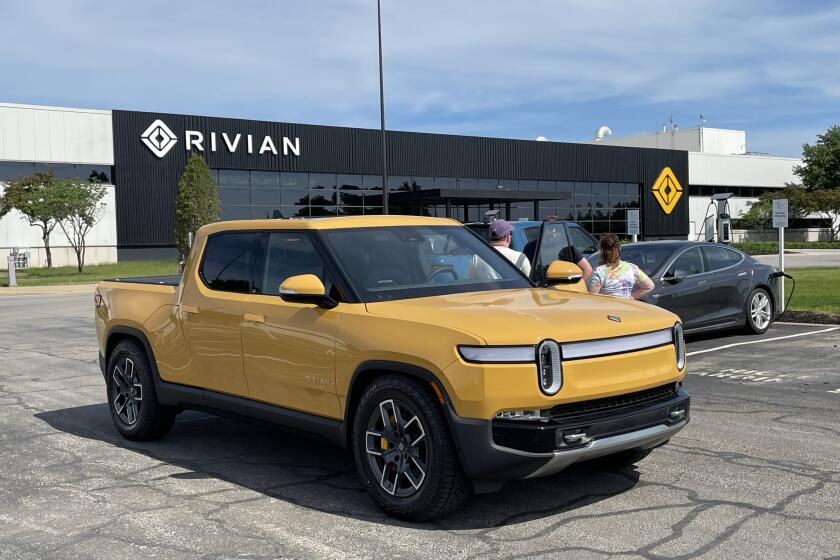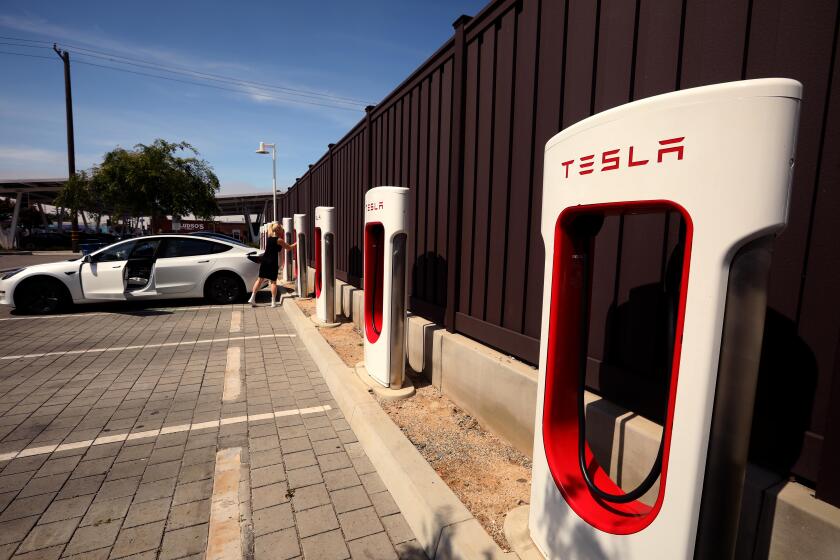Minority Car Dealers
Latino and Asian car dealers are outnumbered almost 2-to-1 by black dealers, according to the National Assn. of Minority Automobile Dealers, and the gap seems to be widening. Ford, for example, has the car industry’s most aggressive minority dealer development program, with 187 black dealers now and a target of 320 by the end of next year. Yet it has just 28 Latino-owned dealerships and six owned by Asians. Only three of Ford’s 40 dealer trainees are Latino and none are Asian.
“There are very few Hispanics or Asians who are general managers, sales managers and secretary-treasurers in dealerships,” said Bernard S. (Rusty) Restuccia, Ford’s marketing services director. Both ethnic groups are where blacks were “10 or 15 years ago,” making it difficult to find potential dealers, he said.
Latinos have been slow to acquire dealerships because they don’t hear about franchises that come up for sale and lack financing, said Henry Valencia, owner of an Oldsmobile, Pontiac, Buick, Chevrolet and GMC dealership in Espanola, N.M.
Blacks, he said, have been much more successful in organizing pressure on the auto makers’ dealer divisions to tell them of available dealerships, he said. “We’re lacking as far as organization is concerned. . . . (Latinos) have got to get more interested in letting the divisions know they’re interested in being dealers.”
The main reason for the lack of organization is that few Latino dealers feel themselves to be minorities rather than mainstream entrepreneurs, he said.
Asian-American dealers have suffered because they are not always perceived as a minority requiring special consideration, said Andy Chang, an immigrant from Taiwan who owns Alhambra Mitsubishi and Toyota of Pasadena. Yet such dealers can do better than white or black dealers in Asian communities such as Alhambra because they understand local demand and credit histories better, he said.
“It is definitely an advantage. I understand the area,” Chang said. “I can sell more cars with less problems in this town than a white dealer or a black dealer.”
Southern California’s huge Latino population doesn’t guarantee customers for Latino-owned dealerships, said Patricia Olivus Peskin, president and majority owner of Tom Flores Hyundai in San Bernardino. Since opening the dealership on June 15 of last year, Peskin has tried everything to attract Latino buyers--Spanish-language radio, newspaper and cable television ads, even a live broadcast from the dealership by a popular local disk jockey and several mariachi bands--and nothing seems to work, she said. “Here we are sitting with 6 million Hispanics in my back yard, and I can’t find them. And I went to school with them!”
Even bringing in former Los Angeles Raiders head coach Tom Flores as a minority partner and putting his name on the dealership hasn’t helped, she said. “I thought that would lead them like a pied piper.”
The dealership is thriving nonetheless, with $16 million in sales in its first 6 1/2 months, she said. But her surveys have shown that 58% of buyers are black and only 28% are Latino.
The continued scarcity of minority car dealers has prompted calls for legislative action. Nearly every state in the country has dealer laws that shield dealers from pressure by manufacturers, but a Michigan legislator has said such laws should be used to promote affirmative action programs as well.
The laws typically prevent car makers from authorizing new dealerships close to existing dealerships and from controlling the sale or inheritance of dealerships. The Illinois legislature amended that state’s dealer laws in 1983 to state that “nothing herein shall be construed to prevent a franchiser from implementing affirmative action programs.”
The legislation has not affected the awarding of dealerships in Illinois, where programs by manufacturers to put in more minority dealerships have not been resisted by dealers, said Joe McMahon of the Illinois New Car and Truck Dealers Assn.
Michigan State Rep. Raymond Murphy held a hearing on the subject last June and says he is about to introduce similar legislation in his state. The amendments would encourage manufacturers to put more minority-owned dealerships into cities that have already been carved up by existing dealers, he said. “There’s a very large piece of pie that’s already been sliced. We’re asking that some of those slices be sliced again.”
California’s dealer code does not mention affirmative action programs in connection with the distribution of dealerships, said Sam W. Jennings, executive secretary and chief administrative law judge of the New Motor Vehicle Board in Sacramento.



